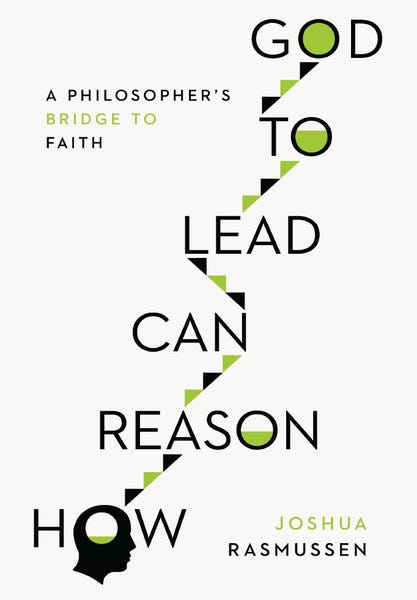Top 30 Apologetics Books (#13): Søren Kierkegaard, Philosophical Fragments
Plus: Joshua Rasmussen on Free Will
Quotable
Stop reading this. Can you? Is it up to you whether you continue reading? If so, then you have some measure of "free will." In other words, you have the power to choose between options.
you might be unsure whether you actually have free will. Perhaps you are open to the idea that physical laws take away your free will. It is understandable: the particles in your brain follow the laws of physics, and the laws of physics are not up to you. In other words, if particles pull all the strings, then you are a puppet of their powers.
It is not my purpose here to force you to believe in free will (or anything else). My goal, rather, is to highlight an additional feature that you might think you have: the power to choose.
Here, briefly, is one reason you might think you have the power to choose. You sense yourself making choices. Consider this: senses are your windows into reality. Your visual sense of tables and chairs, for example, is your window into an actual world with tables and chairs. Your sense of your own thoughts is your window into actual thoughts within your mind. Similarly, your sense of your own power to make choices may be a window into your actual power to make choices.
While senses can mislead, they don't have to. Your sense that you are seeing words on a page could be an illusion. But it probably isn't. Unless you have some reason (presumably via some sense) to doubt your sense, your sense itself provides you with some evidence. So, if you do have the sense of yourself making choices, your sense of choice is some evidence for the reality of choice, just as your sense of these words is some evidence for the reality of these words.
Now if you do think you have at least some power to make choices, then you may appreciate an additional problem with building minds from mindless molecules. The problem is about constructing your power to choose. How do you build a power to choose from particles that have no power of their own to make any choices? Particles obey physical laws, and it is not up to them whether to obey those laws. All particles everywhere obey laws without any choice. Either the particles move deterministically along a single fixed path, or they move randomly. Either way, they make no choices. How, then, can you have the power to make choices? How does choice arise from non-choice? Whatever one’s answers to these questions, they invite a deeper look into the nature of minds.
— Joshua Rasmussen, How Reason Can Lead to God: A Philosopher’s Bridge to Faith (IVP Academic, 2019), 83, 84.
Note: Below, Dr. Rob Bowman continues his series on the 30 most important apologetics books in church history. See his earlier posts in previous weeks of Useful Things.
#13: Søren Kierkegaard, Philosophical Fragments (1844) and Concluding Unscientific Postscript to “Philosophical Fragments” (1846)
Søren Kierkegaard (1813-1855) lived a relatively short life, during which he was not widely known outside his native Denmark. Yet in the twentieth century he became one of the dominant influences in Western philosophy and theology. Kierkegaard (pronounced KEER-kuh-gore) is generally regarded as the father of both religious and atheistic existentialism. Like many profound thinkers, Kierkegaard is often cited but rarely understood. Scholars both sympathetic and critical interpret his thought in radically different ways.
More so than most theologians or philosophers, Kierkegaard wrote out of the intensity of his own spiritual journey. A year after his mother died, Søren rebelled against his father and sought his escape in a life of wanton pleasures. His conduct was so colorful that he became the inspiration for a character in a novel written by Hans Christian Andersen, Søren’s childhood classmate and Denmark’s other famous nineteenth-century son. The prodigal son eventually realized the emptiness of that path and returned home to his father, who died soon thereafter (in 1838).
In 1844 and 1846 Kierkegaard wrote Philosophical Fragments and the follow-up work Concluding Unscientific Postscript to “Philosophical Fragments.” He wrote these books under the pseudonym Johannes Climacus (“Johnny Climax”). Kierkegaard’s use of pen names was part of his method of, as he called it, “indirect communication.” This method seeks to communicate ideas not by directly asserting or arguing for them, but by speaking in such a way as to provoke people to think about them and embrace the truth “on their own.” It is interesting that Hans Christian Andersen is famous for his own method of indirect communication, namely, his popular children’s stories.
Kierkegaard’s writings were a kind of “apologetic,” but an unusual one in that its purpose was not to convert people of other religions to Christianity but to convert nominal Christians to authentic Christian faith. Kierkegaard viewed himself ideally called to this work because he himself struggled to become a Christian. Most 19th-century Danes assumed they were Christians but had accommodated the gospel to something supposedly “plausible” and inoffensive. A “plausible,” nonparadoxical, inoffensive Christianity is not, Kierkegaard insisted, the Christianity of the New Testament. Although Kierkegaard opposed traditional apologetics, he offered a kind of “indirect” apologetic in Philosophical Fragments for Christianity in keeping with his method of indirect communication. The gospel of God incarnate as Savior and Teacher is not something that anyone would invent and indeed something that unbelievers find offensive; it must therefore have been revealed. Nominal Christians vainly thought they were true Christians merely because they accepted the gospel facts. Kierkegaard saw it as his mission to make it more difficult to become a Christian.
Today, Kierkegaard is often seen as a fideist—someone who maintains that faith cannot be defended rationally. That is true, but his fideism should be understood in its context. To put it bluntly, Kierkegaard was trying to reach Lutherans, not atheists.
—
Note: This series originally appeared in the Apologetics Book Club group on Facebook and was revised for publication as a book, Faith Thinkers: 30 Christian Apologists You Should Know (Tampa, FL: De Ward, 2019). The book includes an introduction, additional quotes from each of the 30 books, readings for each author, and a list of other recommended readings. For a free excerpt from the published book, please visit https://faiththinkers.org.
—Rob Bowman Jr. is an evangelical Christian apologist, biblical scholar, author, editor, and lecturer. He is the author of over sixty articles and author or co-author of thirteen books, including Putting Jesus in His Place: The Case for the Deity of Christ, co-authored with J. Ed Komoszewski. He leads the Apologetics Book Club on Facebook.
News*
An Oxford professor allegedly stole ancient Bible fragments and sold them to Hobby Lobby
Chinese authorities demolish megachurch, arrest pastors
Norm Geisler film ‘Not Qualified’ set to release in 2020
The Ironies of the Evangelical ‘Crisis’
[“Thomas Kidd’s excellent new book, Who Is An Evangelical? The History of a Movement in Crisis (published by Yale University Press), offers a brief introduction to evangelical history in North America as well as a snapshot of current debates over evangelical identity.”]
Christianity Continues to Lose Demographic Ground in U.S.
Explainer: What you should know about churches and tax exemption
Philosophy: A Guide For Christians
[“Christians should be interested in philosophy. Here are 22 books that make that case.”]
Discover the Truth about Isa al Masih (Jesus Christ)
[“Was the Injil (the Bible) corrupted? Did Isa al Masih (Jesus Christ) die on a cross? What do Christians mean by saying he is the Son of God? Many Muslims have these questions and have never heard a good answer. An eight-episode animated series—called Journey to Truth—seeks to winsomely present the truth of Jesus in order to overcome some of the common barriers people have to following Jesus.”]
Licona's Statement: The New Testament Gospels are Historically Reliable Accounts of Jesus
Ehrman's Statement: The New Testament Gospels Are Historically Unreliable Accounts of Jesus
Federal study finds nation's assisted suicide laws rife with dangers to people with disabilities
(*The views and opinions expressed in the articles, videos, podcasts, and books linked to do not necessarily represent the views of the editors of The Worldview Bulletin.)
eBook, Audiobook, and Software Deals
Note: These deals were valid at the time this edition was written, but prices may change without notice. The same deals are often available on Amazon sites in other countries.
eBooks
Faithlife Ebooks, a division of Logos Bible Software, gives away a free ebook every month. October’s book is The Secret Battle of Ideas about God by Jeff Myers. You can also pick up Understanding the Times, Understanding the Faith, and Understanding the Culture, also by Jeff Myers, for $4.99 each. You can read the ebooks using their app, or in Logos Bible software (free version here).
Use coupon code SAVE20NOW to save $20 on any Logos resource (except base packages) until October 31st.
Fortress Press is running a fall ebook sale with over 1,000 titles discounted from $2.99-$9.99. See all the titles here, which can be purchased at Amazon and Barnes & Noble. Prices are good through December 2.
Knowing Christ Today: Why We Can Trust Spiritual Knowledge by Dallas Willard - $1.99
Rediscovering Paul: An Introduction to His World, Letters and Theology by David B. Capes, Rodney Reeves, and E. Randolph Richards - $6.99
The Triumph of Christianity: How the Jesus Movement Became the World's Largest Religion by Rodney Stark - $1.99
Evidence of the Afterlife: The Science of Near-Death Experiencesby Jeffrey Long and Paul Perry - $1.99
Surprised by Oxford: A Memoir by Carolyn Weber - $1.99
In the Highest Degree: Volume One: Essays on C. S. Lewis’s Philosophical Theology—Method, Content, & Reasonby P. H. Brazier -$2.99
Why Believe?: Reason and Mystery as Pointers to God by C. Stephen Evans - $1.99
The Gospel of the Lord: How the Early Church Wrote the Story of Jesusby Michael Bird - $3.99
The Inspiration and Interpretation of Scripture: What the Early Church Can Teach Usby Michael Graves - $3.99
The Missing Gospels: Unearthing the Truth Behind Alternative Christianities by Darrell Bock - $2.99
Audiobooks
Becoming Dallas Willard by Gary W. Moon - FREE from Christian Audio for the month of October. You can also pick up Lewis on the Christian Life by Joe Rigney for $4.98.
Software
The Logos free book for October is Freedom of the Will (The Works of Jonathan Edwards, Vol. 1. You can pick up two other books in the series for $1.99 and $4.99, respectively (see all three at the link above).
Video
The argument from possible causes for a necessary being - Joshua Rasmussen
NDE (Near Death Experiences): An interview with Gary Habermas
Whole in Christ: Gender and Sexual Identity in Gospel Perspective - Paul Coulter
Homosexuality: Texts and Hermeneutics - Dr. Christopher Yuan
Craig Hazen: Christianity in a World of Religions
Audio
Artificial Intelligence and Our View of Human Persons | Think Biblically
Common Misconceptions about the Trinity (Fred Sanders) | Crossway Podcast
Carpe Diem Redeemed: Eric Metaxas interviews Os Guinness | The Christian Outlook
The Problem of Evil | Stand to Reason
Has the church misunderstood St Paul? Steve Chalke vs. Phil Moore | Unbelievable?
The Psychology of Unbelief (Part 2) | Apologetics Canada
Book Highlight
*Unless otherwise noted, descriptions are those provided by the publisher, sometimes edited for brevity.
Do you value reason, science, and independent thinking? Are you skeptical of beliefs that people maintain merely "on faith," yet you remain interested in the big questions of life? Do you hope there could be a greater purpose to the universe, if only that were realistic?
If so, then philosopher Joshua Rasmussen can encourage you in your journey. Beginning with his own story of losing faith and the belief in any ultimate purpose in life, he then builds a bridge to a series of universal truths about ultimate reality. Using only the instruments of reason and common experience, Rasmussen constructs a pathway—step by step, brick by brick—that he argues can lead to meaning and, ultimately, a vision of God.
Reviews
“Rasmussen provides a masterpiece argument for God. He delivers every step in a clear and engaging style. Powerful. Beautiful. Transformative.”
— William Lane Craig, professor of philosophy, Talbot School of Theology and Houston Baptist University, coauthor of Philosophical Foundations for a Christian Worldview
“This short book contains a bold, original, and provocative argument that shows how reason can lead a person who is genuinely seeking truth to God. It is written in simple, ordinary language and makes no appeal to authority. Although Rasmussen appeals only to truths that he thinks should be universally accepted, a good deal of the force of the book stems from the personal story of Rasmussen himself; his courage and honesty draw the reader into a similar journey.”
— C. Stephen Evans, university professor of philosophy and humanities, Baylor University
Find How Reason Can Lead to God at Amazon, IVP, and other major booksellers.
Subscribe to The Worldview Bulletin, sent monthly, and receive access to the full September issue, including:
Dr. Paul Copan on atheological arguments from psychology and biology
Dr. Paul Gould on the meaning and significance of culture
Dr. Michael Licona on chronological aspects of events in the Gospels
and lots of news, book deals, new books, and conference info.
You’ll also receive access to our full archive of past issues and posts, and every issue for the upcoming year. Be equipped, inspired, and informed!
Until November 30, receive a 25% discount off of our normal rate of $5/month, good for the next 12 months. That’s only $3.75 per month! This deal will expire on November 30, so be sure to lock in this special rate.




